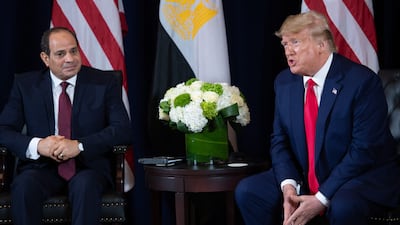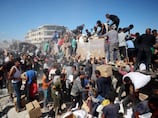"I thank his excellency President Trump, not once, not twice, but 100 times!"
These words of profound gratitude were delivered by Egypt's President Abdel Fattah El Sisi during a meeting with Donald Trump's envoys Steve Witkoff and Jared Kushner, the day after Israel and Hamas agreed to the first phase of a Gaza peace plan presented by the US leader.
Two days earlier, the Egyptian leader said he believed Mr Trump deserved the Nobel Peace Prize for the plan. On Saturday, Mr El Sisi's office announced he and President Trump will on Monday lead an "international peace summit" in the Red Sea resort of Sharm El Sheikh, to be attended by more than 20 leaders.
The gathering has been inspired by Mr Trump's “vision” of bringing peace to the region and his “urgent” efforts to end conflicts around the world, the office added.
Presidents Trump and El Sisi have had a fraught relationship since the US leader floated the idea of expelling Gaza's two million-plus Palestinians and turning the coastal enclave into a glitzy resort. But a letter from Mr Trump to Mr El Sisi that gave assurances he would follow through on the implementation of the deal helped push the truce over the line.

Mr Trump's ironclad support for Israel in its devastating military campaign in Gaza deepened the disconnect between the two men, who had expressed great admiration for each other during Mr Trump's first term in office (2017-2021).
The Gaza "Riviera" proposal, condemned widely as a form of ethnic cleansing when mooted in February, angered Mr El Sisi. He rejected the idea because, if implemented, he said it would breach Egypt's national security and hollow out the Palestinian cause that his country has championed for decades.
Mr El Sisi also cancelled a trip to Washington in February, according to sources at the time, that would have included his first meeting with Mr Trump since he returned to the White House in January.
Mr El Sisi never mentioned Mr Trump by name when he publicly lambasted his Gaza proposal but instead stepped up his criticism of Washington's closest ally Israel, accusing it of committing genocide in Gaza and starving hundreds of thousands of its Palestinian residents.

He has simultaneously used flattery delivered in flowery language to persuade Mr Trump to use his leverage to stop the war and even bring peace to the wider Middle East. If there is one leader who can bring peace to the turbulent and war-scarred region, it's Mr Trump, he has often said.
Mr Trump's assurances that his plan will be implemented and lasting peace will comes to the territory clinched the Gaza deal. Two days later, the guns fell silent in Gaza for the first time since March and only the third time since war broke out two years ago.
Mr El Sisi "played it the only way he could have played it", said Michael Hanna, director of the US programme in the International Crisis Group. "It is not a unique approach to curry favour with Trump. It's a given in the diplomatic playbook when dealing with Trump."
Unique or not, Mr El Sisi did well not to publicly criticise the US President in the 10 months since he took office – and that paid off handsomely.

Mr El Sisi, moreover, is now basking in international glory as the leader of a country that, along with US ally Qatar, laboured hard and long to end one of the Middle East's deadliest and most brutal wars in the modern era.
Sources said Monday's Sharm El Sheikh summit is not merely for show. The Egyptian leader expects Mr Trump to pledge before the world leaders and the glare of the international media that he would follow through the implementation of his plan.
And that's not all Mr El Sisi is after.

He told his counterpart from Cyprus that he wants the 20-point plan, and the international police force it envisages for Gaza, to be adopted in a UN Security Council resolution, a suggestion the sources said was designed to give the move more weight through international legitimacy.
Egypt and the US have been allies for nearly 50 years, with the Egyptians receiving billions of dollars in economic and military aid since Cairo signed a US-brokered peace treaty with Israel in 1979.
The pair regularly hold joint war games, share intelligence, co-ordinate in counter-terrorism and US navy ships receive priority when transiting the Suez Canal. US military planes also routinely use Egyptian air space.
Relations, however, had become somewhat soured over occasional criticism in Washington of Egypt's human rights record. Segments of the US military aid to Egypt – $1.3 billion annually – have at times been suspended.
But relations have always weathered those disagreements and, under the Trump administration, seem at their strongest level despite their past differences over the future of Gaza.

Unlike his predecessors Joe Biden and Barack Obama, Mr Trump pays little heed to the human rights records of other countries, preferring to recalibrate Washington's relations with the rest of the world around pragmatic issues such as trade and security.
"El Sisi sees Trump as a strong leader, who controls his party and enjoys solid domestic support despite some grumblings," said Mr Hanna, the expert from the Crisis Group based in New York.
"Trump has a unique capacity to pressure Israeli Prime Minister Benjamin Netanyahu and force decisions from him, but the variable moving forward here is whether Trump can sustain his attention on the Middle East. He is unpredictable and changes his mind a lot."



